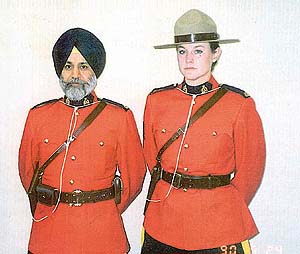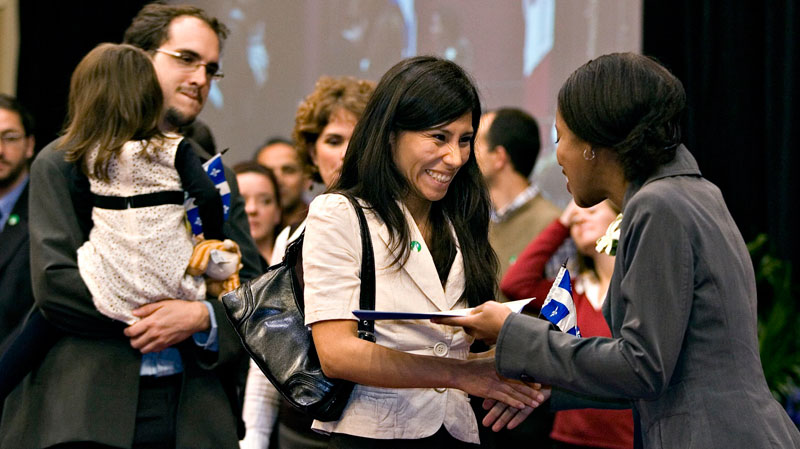
Part III-3 – The Cunning Cottage
One year after Ou Yang started working, they bought a little cottage in Lasalle.
It was a cottage row house, two stories with a basement. “Row” means that there are other houses directly connected on both or one side of the house. The front of the cottage was very narrow, only 4 meters wide and 10 meters deep. The first floor was one meter higher than ground level to give height to the basement, while the rest was 1.2 meters dug into the ground, to make 2.2 meters of livable space.
The front door opened into the combined dining-sitting room. Further ahead was their medium sized kitchen with a small island in the middle. There was a truly minuscule “bathroom,” with just enough space for a toilet bowl and a sink. It is actually called a “powder-room,” a euphemism for a lady’s place that is still in use as culture develops, and it is mainly for the convenience of the guests. Of course, gentlemen are allowed to go as well. A nice spiral wood staircase led up to the second floor where there were two small bedrooms adjacent to a space in the middle that served as their son’s playroom. The strange thing was that the windows were not on the long sides of the cottage, but on the front and back, due to the fact that the cottage was sandwiched between two other cottages. It felt like a long train compartment with misplaced windows! And then there was the basement. It held a garage and a guest-room or other playroom for their son, where they could put the piano.
Ou Yang had always loved things to be nice and beautiful. The decoration of the house then became a significant way for us to know her. The fact that such a cottage was chosen already said a lot about her. The whole development was quite new, and their cottage was only 6 years old, since the Chinese from Mainland China only liked new houses. Why? Maybe it is because all of China is new, with skyscrapers, shiny new stores, and trendy apartments appearing in every major Chinese city. They liked new things. 25 years old apartments were already very shabby and dirty, looking like slums. Ten year old apartments began to look bleak, because the Chinese did not have “Co-ownership Committees” to help clarify rights and obligations, or, in a word, govern their apartments and carry out the proper maintenance.
“Aiya, you have many residential buildings and houses in Montreal that were built in 1900 and even older? How do they look? They must be terrible!”
Her sisters in China were amazed. How incredible it was! In China, buildings erected after 1988, only 21 years old in 2009, already looked so old, dirty, and out of date.
In China, in one area after another, “old” buildings had been torn down to make way for new, more modern ones, with bigger bathrooms, huge sitting rooms and gardens, bridges and fountains everywhere. It seemed that dismantling “old” buildings was as easy as just blowing out a sneeze! There seemed to be no mortgage issues to worry about, nor land acquisition to argue about. Right, for sure, China was a socialist or communist country, where buildings belonged to a ghost-like collective. The country once belonged to everyone in name, yet no one really knew what ownership was, what rights this ownership granted, and who was responsible for what. Although property privatization had been going on for many years, obligations were still not necessarily and automatically forthcoming with ownership. Under the vagueness and ambiguity of no trivial concepts of ownership, even masonry will rot! When human hearts become like poorly mixed cement: either too much cement, resulting in complete rigidity, or too much sand, and not being able to hold even air; water does not help consolidate and “Ethics and Trust” have no place.
Both Ou Yang and Ge Wen were delighted to live in the house. Though not as big as she wanted and neither as new, Ou Yang was satisfied for the moment. As having a family “Cheng Jia 成家 ” had been the first crucial symbol of success for Chinese, “house” became the fundamentally indispensable element for a home or family. In Chinese culture, no matter how successful a person can be in other aspects, if he or she is not married and does not have a home (together with a house), he or she will barely be regarded as successful. A house has become such a preeminent thing in people’s life. After almost 40 years of being deprived of property ownership, without limitations of times and era, we have become fundamentally and thoroughly so poor inside, that we have been paranoid of the impact of being poor and unconscious on the effect of spiritual status. We know that without a home, no souls could survive for long. So with privatization of properties and maybe land in the future of China, can we expect the flourish of happy souls?
Not like many Chinese families overseas who acquired huge houses yet no money for furniture nor heating expense, Ou Yang and Ge Wen preferred to have a smaller house. Ou Yang had taste and a good sense about the balance of living. She wanted to have a nice home with trendy furniture and decorative things. She hung many lovely pictures of her little family along the wall going upstairs; she painted some walls in different colors; she bought exaggeratedly huge flowers from “Pot Pourri” and put them together with some green leaves, dry sticks that were plastic, but made to seem genuine. She would never wanted the idea of buying a huge house with no furniture and barren “white” walls, only to shiver in winter with 15 degrees in the house wearing sweaters and outdoor coats!
The three of them, Ou Yang’s little family, were very comfortable in the cottage. They kept the heat at 24 degrees. In the summer they ate outside and received friends on their small wooden deck under a charming red umbrella. Ou Yang had planted tulips the previous November, and now she was planting more perennials and annuals. She invited her boss and his wife. Ou Yang showed her beautiful white teeth as she smiled from ear to ear when she finally heard the compliments about her new house and her good taste. The few lines between her eyebrows were gradually disappearing now that she was under her own roof and was eliminating the factors that were carving them. She helped her husband cook a delicious and exotic banquet, both western and Chinese, and her son was playing the piano downstairs. Every thing went extremely well. Ou Yang was soaked in happiness, feeling proud of being a person full of savvy.
Time passed without them noticing, and their son Sonny turned six years old in 2010. Ou Yang was promoted twice because of her good performance and was earning forty-eight thousand Canadian dollars a year. Ge Wen made a little bit more. Because he did not speak French, he always felt that there was some discrimination against him.
“It was discrimination against Chinese!” He would think.
He started talking about moving to Vancouver, where he would not have as much of a problem with the language. There is a huge population of Chinese in Vancouver, and Ge Wen thought they would feel better there. But the issue naturally went away, as he was the only one who said so, and the fragile one among all others. Their son started primary school.
With their son going to school, Ou Yang and Ge Wen’s life became more stable, and they began to relax. Sonny was older now, and gaining more independence each month, which also gave Ou Yang and Ge Wen more time for both of them. They were not bound from minute to minute any more. They could literarily enjoy some time without having to watch their son playing in the yard or outside. They could even send their son to the home of his school friends, or rather to that of her close friend who happened to be the mother of their son’s friend. They could go see a movie now and enjoy a bit of free time- time when they could have rekindled something that had begun to be extinguished by the daily routine.
Over the issue of taking turns to watch over the kids among the school parents, Ge Wen and Ou Yang had a huge and definite disagreement at the beginning. He only agreed with reluctance to try once. He would rather stay home to be with their son when Ou Yang wanted to go out, and he would frown when his son’s friend wanted to sleep over Friday night.
“Don’t bother other people!” was his usual righteous thing to say when it came to matters like these.
If he had not been willing to also provide his service, it surely would have become a “bother!” But a father is a father. He accepted it, after seeing his son jump up and down upon hearing the news that his good friend was coming, and seeing that many other people were doing it. His son needed friends!
What about them? Did they need friends?
For Chinese men or women to have a friend of the opposite sex is not a possibility. It is not common to even find true friends amongst the same gender. Women could have girlfriends for going shopping or gossip, but men do not go out after work to grab a drink to keep up with the world. We Chinese just do not talk nonsense. For overseas Chinese men, it seems that their world is literarily getting “smaller and smaller,” narrowing it down to their homes. In China, they go out drink and sing karaoke for “business” and social networking, but in Canada they don’t. Maybe it is too cold too long in winter and their nuts have to hide inside their bellies. Their busy struggle for survival has made it almost impossible to have any extra time for friends, anyway. If we say that friendship in China is as shallow and hypocritical as the relationship between wolves and lambs, here it becomes a luxury.
Sometimes it is difficult to understand why our Chinese culture centers on Family values. Having no time could be a good excuse. The need for making friends comes from a hunger, just like the need for a wife or husband. We have been trying to combine friendship with couple-ship, maybe in order to save time and be efficient, or maybe because we have wished it so, but it randomly works out that way. We wish for friendship to serve as the base for couple-ship, yet that is probably a “Fleur Blue” (a hopeless romantic), which seldom blossoms. The chances of turning our spouses into friends with whom we can talk about anything and everything, is as scarce as the writer of this story falling from a capsule in space and breaking the speed of sound like Felix Baumgartner.
Yet Ou Yang ended up uniting with western or non-Chinese families for such services, because Ge Wen was not the only one; there were many others just as distrustful and uncomfortable as he. They didn’t see the necessity of keeping their social life going or having some private time for themselves, thinking that it was their full responsibility to watch over their kids, and they also genuinely did not want to “trouble” other people! They didn’t trust others; at the very least they didn’t feel comfortable with language and cultural issues. In their minds, they would feel guilty for their kids and their friends, and always worried if that ever happened from time to time.
We Chinese are basically incapable of trusting people other than our family members, or people who are connected to our family members. How much this distrust comes from self-distrust or lack of self-confidence, it is hard to say. In China, we would always have family to help with our kids, either the in-laws or brothers and sisters, or in the worst case, we could afford nannies from the far-away countryside to be live-in baby-sitters, sometimes until kids were up to 15 years old. In Canada, we are stuck with kids. No cheap help is available and we refuse to work with other people. But luckily and out of blue, Ou Yang had a couple of friends she seemed to trust. Obviously, she did have certain self-assurance, self-trust and pragmatic entrepreneurial spirit.
As a great nation, we Chinese are polite, quiet, and always agreeable when among other people. But under such great merits, there seems to exist a deadly rotting element of distrust and untrustworthiness. It seems that we Chinese, both as individuals and as a nation, really lack the need to connect with other individuals or other nations, and the ability to truly connect. “For what?” we would ask, and then wonder about the question ourselves. We do connect within ourselves, but even that seems reluctant and passive! It could only happen when desperately necessary or for the sake of “business.” This pathetic connection is so often of the materialist nature that it doesn’t really hold, like the poorly mixed concrete combination, with the fault always falling on others.
“For a cunning cottage we could share…” Oh, yes, a home to have, a cunning cottage we could share…
* The title is an excerpt of a George Gershwin’s song: I’ve Got A Crush On You
To Be Continued…




Recent Comments